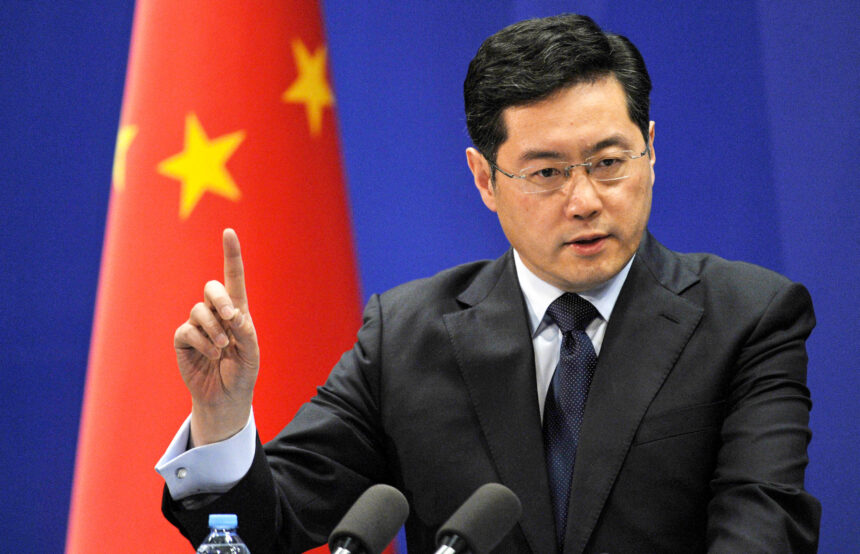China has vowed retaliation after the United States introduced the largest tariff increase on nearly all Chinese goods. The new duties, raising the total levies to at least 54%, are expected to severely impact Chinese exports to the US.
Beijing has promised to pushing back against President Donald Trump’s latest tariff escalation, a move puts the two largest global economies on a direct collision course, threatening trade relations and supply chains.
Following the announcement, China’s Ministry of Commerce urged the US to revoke the tariffs and resolve disputes through diplomatic discussions. The ministry issued a statement calling the tariffs damaging to both global supply chains and economic growth, vowing to take strong countermeasures.
Trump’s decision has raised the average US tariff on Chinese goods to 65%, including previous tariffs. Other countries, such as Vietnam and Cambodia, have also faced new tariffs, but China remains the main focus of the trade dispute, having been targeted multiple times before.
“If the earlier 20% tariff increase dealt a blow to US-China trade, this latest hike is a much larger weapon,” said Jennifer Welch, a geoeconomics expert at Bloomberg Economics.
Since the announcement, the yuan weakened in both onshore and offshore markets, despite efforts from China’s central bank and financial institutions to stabilise it. The offshore yuan saw its biggest drop since December before recovering slightly.
China Stocks
Meanwhile, China’s key stock index, the CSI 300, fell 0.7% by midday Thursday. Government bonds gained value as speculation grew that China’s central bank might introduce additional monetary easing.
According to Bloomberg Economics, these new tariffs could cut Chinese exports to the US by 80%. Economists estimate that this could shave 1 to 2 percentage points off China’s economic growth, prompting Beijing to consider increased economic stimulus measures.
President Xi Jinping now has less than a week to decide on Beijing’s response before the tariffs take effect, but talks remain stalled. High-level discussions have yet to resume, and Trump and Xi have not spoken since Trump’s return to office. This marks the longest communication gap between a US president and China’s leader in two decades.
Analysts at Morgan Stanley believe China faces greater challenges than other nations in resolving these disputes. “The US is raising tariffs to protect critical industries and encourage domestic production. This makes it harder for China to negotiate or see a reduction in these duties,” they stated in a report.
In previous responses to US tariffs, China has taken steps to avoid harming its economy, which is already grappling with challenges like a property market crisis and prolonged deflation. Countermeasures have included export restrictions on key materials, new tariffs on American agricultural products, and investigations into US businesses.
China has also limited its companies from investing in the US, reports suggest, potentially giving Beijing leverage in future trade talks.
Shipments from China
The economic tensions have spilled over to private companies. Chinese officials have resisted pressure from Walmart to lower prices to manage the impact of the tariffs. Meanwhile, Hong Kong businessman Li Ka-shing faced criticism in China after selling his Panama ports to appease US demands.
“These latest actions could harden Beijing’s stance, pushing the conflict beyond tariffs,” said Martin Chorzempa, a senior fellow at the Peterson Institute for International Economics in Washington.
The US has also eliminated the de minimis exemption, which allowed Chinese packages worth $800 or less to enter duty-free. This change, effective May 2, is expected to hurt e-commerce platforms like Shein and Temu, which rely on direct shipments from Chinese factories.
Analysts estimate that such shipments account for 11% of China’s exports to the US.
Ending this exemption could have repercussions on both sides. “US consumers will face higher prices, and Chinese exporters will see reduced demand, adding to deflationary pressures,” said Lu Ting, chief China economist at Nomura Holdings.
Trump’s tariff announcement stirred reactions on China’s social media platform Weibo, where some users criticised the US president’s actions. Others supported Beijing’s promise to retaliate, with one commenter quoting Mao Zedong: “It’s time to abandon hopes and prepare for battle.”
Related News:
China Says Trumps Reciprocal Tariff Plan Threatens Global Trade

Geoff Thomas is an award winning journalist known for his sharp insights and no-nonsense reporting style. Over the years he has worked for Reuters and the Canadian Press covering everything from political scandals to human interest stories. He brings a clear and direct approach to his work.














